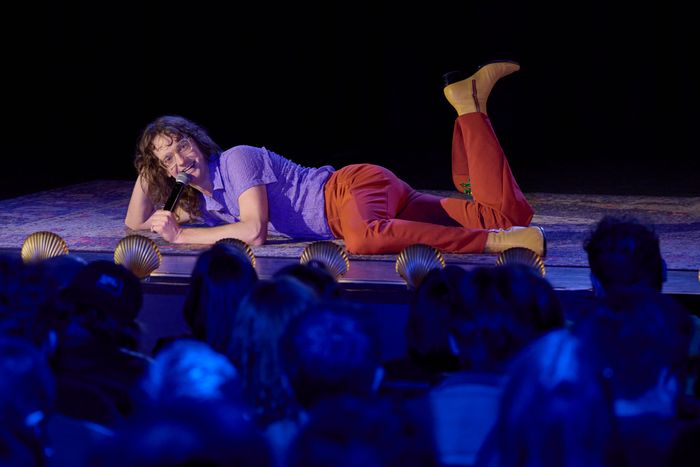
In his Peacock special Hell, Chris Fleming more than once attempts to explain how he became the person he is now. It’s a good comedian’s device: the childhood story that illuminates the current onstage weirdo, an anecdote that’s part autobiography and part personality test. For Fleming, one version of this is to display a photo of him as a child standing with his family; while everyone else is looking off to one side, he’s the only one who’s actually looking at the camera. In another photo, he’s a kid typing on a computer with a bird on his shoulder. A third version of this, the longest one, is a story about visiting his aunt that winds up with Fleming being “witch-christened by a seaside coven.”
They’re fun explanations, but they don’t have the satisfying snap of a backstory that suddenly shows you who a person is. It’s hard to say what kind of backstory could do that, in this case. Fleming’s look and presence are a bit like if Gumby wore a British barrister’s wig and loved to maintain awkward eye contact. He contorts himself into odd shapes and twists around the stage, singing songs that skid past randomness and land somewhere in the territory of nihilist surreality. It’s difficult to picture any scenario where Fleming could stand on a stage and calmly lay out how he got this way, because he feels like he’s always been this way. That’s what’s most fun about watching him: the sudden, total sense that you’ve walked through a portal into whatever weird world produces people like this.
Some of the strongest jokes in Hell are those that embrace that alternate world entirely, unapologetic and bizarre without any effort to soften them. In one, a song accompanied by images on a screen behind Fleming, he begins from the premise that a single gerbil costs the same as a carton of raspberries. The song then takes these two items as equal and blithely proceeds as though the question of whether to spend your $4.99 on raspberries or a gerbil is both regular and universal. (He refers to the raspberries almost solely as “Driscolls,” and this choice is the difference between simple goof and perfection.) In another joke of the same vein, Fleming starts from a pretty standard kind of observational humor: The airline CEOs who show up on in-flight welcome videos are much worse performers than the professional actors who play the flight attendants. Then the joke somehow descends into a demonic realm. It’s exquisitely strange.
The only drawback to Hell is that it can be hard to sustain that odd portal to wherever Fleming’s brain lives. A certain amount of the ticklish pleasure of his work comes from the twin engines of surprise and disbelief, and after a while, Fleming has to find devices that shift those engines into gear again. Hell manages this fairly well by dipping in and out of songs, some pretaped sketches, and stretches that are closer to garden-variety stand-up. (In one of these, Fleming has a joke about a Nissan Cube that will forever change any mental association you had with the words “Nissan Cube.”) But inevitably, Hell has moments where it slips a little. It never fully loses its grip, but the inclusion of a crowd-work moment that goes on for too long starts to feel unnecessary. The gag, which begins with Fleming messing around with an empty seat in the front row, starts off on an interesting note, then becomes mostly ornamental futzing, without any of the payoff that might make that kind of distraction worthwhile. It doesn’t help that the deliberate grunginess of Hell’s design — dark lighting, small theater, a purposeful lack of polished impersonal sheen — makes exactly that kind of interjection hard to hear and follow for viewers at home. The point of it is appealing in the abstract: Look what happens when this person’s weird perspective crosses the fourth wall and has to interact with reality! But the execution, too muddy and too aimless, doesn’t quite justify that idea.
The better version of it is also the one Fleming is better able to control: the short intro section where he does his play on a standard comedy-special trope of walking from backstage out in front of an audience. He begins with the required “cool comedian walking out onstage” hero shot, and then he trips and falls. A less imaginative comedian going for adorkable quirk would’ve stopped there, with maybe a drink spilled over them and a frantic PA trying to mop them up. But Hell first has Fleming desperately trying to catch a microphone that starts flying around of its own accord, and then it cuts to a shot of Fleming who has now fallen into the stage stairs. His torso is caught midway into the wood, and his limbs protrude out of the steps from impossible angles. An exec and a PA gather around to discuss what to do, eventually deciding that Fleming may need to be put down like a horse before leaving him there in the dark. As the opening credits play, Fleming grunts and strains to get out, and then the camera cuts to him walking out onstage to start the show. It’s a perfect way for Hell to start, with Fleming halfway caught in his own uncanny netherworld. It’s where the entire show takes place, and Fleming makes Hell an endearing place to visit.


